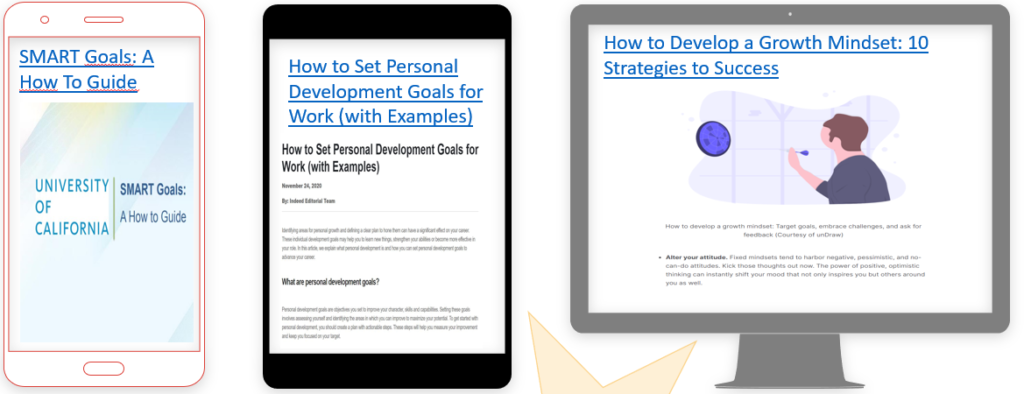
Module 1
"Setting Personal & Work Goals"
"Setting Personal & Work Goals"
Aim
The purpose of this module is to educate dancers in topics related to setting personal and work goals, which will develop their confidence and allow them to maximize their potential.
By the end of this module, you should be able to...
Knowledge
- Use SMART approach to setting personal and work goals that will have a positive impact on your career
- Identify individual steps that are necessary to take to achieve the set goals
Skills
- List new skills that can function as a personal or work goal, such as better time management, active listening, sense of direction, new habits, improving an existing skill, etc.
- Keep a high productivity level at work, track and review your progress
Attitudes
- Develop a growth mindset and be open to new opportunities rregarding personal and professional growth
Key-concepts
Personal goals
Personal goals are commonly set to improve character, skills or capabilities. They can be connected to anything you would like to achieve. It involves identifying areas in which you want to get better.
It is a good idea to create a plan with steps for personal development because you will be more self-motivated and gain a positive attitude.
Work goals
Work goals refer to the steps that you should take to advance in your career. They can be both short-term and long-term.
You can also discuss the setting of work goals with your manager or supervisor during a performance review. By doing this, they will be able to help you with measuring your development.
SMART goals
SMART is an acronym that describes qualities of a correctly set goal.
To make your goals reachable, they should be:
- Specific
- Measurable
- Achievable
- Relevant
- Time bound
Achieving goals
Achieving goals is not easy, but also not impossible. Follow these tips to achieve your goals:
- Plan the steps
- Set deadlines
- Reward yourself
- Find a goal partner
- Review your progress
Growth mindset
Setting and achieving personal and work goals is much easier for people with a growth mindset. Having this kind of mindset means that you believe that you can grow and improve, and that your talents and abilities can be developed through effort, good teaching and persistence.
Possible answers
- Improving time management
- Developing emotional intelligence
- Active listening
- Learning new things
- Improving speaking skills
- Meeting new people
- Attain a leadership role
- Increase earnings
- Be more productive
- Find new challenges
What questions should we ask ourselves to make sure our goals are SMART?
Possible answers
Specific
What do I really want to do? Who can help me? Which resources can I use?
Measurable
Any question asking „How much/many …?“
Achievable
How can I accomplish this goal? How realistic is it? Do I have enough time/finances?
Relevant
Is the goal worth it? Is it the right time? Is this goal suitable for me or my career?
Time bound
When? What can I do in six months or a year? How long will it take to reach this goal?
SMART Goal setting with Strides
Strides is a flexible goal setting app that lets you track good and bad habits and SMART goals. You can see your goals and habits on a dashboard, use a template to set a SMART goal and view your progress in the form of streaks, rates, line charts and more.
The app allows the users to set reminders and take part in goal streaks to maximize their motivation. There are four different tracker types that can be used for a number of things. It is very intuitive to customize any of them according to your needs.
Find out more at: https://www.stridesapp.com/
SMART Goal setting
Do you think a mobile app can be helpful for setting SMART goals? Why or why not? Research other apps on the internet that might help you with goal setting.
Think of a goal you achieved in the past. Did you use the SMART approach? What other strategies could be used?
Write down one of your current goals and reflect on it. Does it follow the SMART approach? Can you develop it further?
How is setting and achieving personal and work goals affected by the COVID-19 pandemic? Can you think of any positive influences? Discuss.
To what extent can setting and defining goals help you achieve them? What key factors influence goal-achieving?
Being SMART
SMART and SMARTER
SMART is an established tool used to plan and achieve goals.
The basic acronym is often supplemented with additional letters E and, which represent Evaluated and Reviewed.
Possible drawbacks
Different interpretations of meaning of SMART letters lead to loss of effectiveness and easy understanding.
Some experts believe that SMART does not work for long-term goals, as it does not allow for much flexibility.
How to set a clear goal
Write down your goal in detail. Use the SMART approach. You can also write the goal as a personal mission statement.
Think about measuring your achievement of this goal. How will you do this?
After setting the goal and metrics, reflect on how it makes you feel. Excited? Challenged? If the goal does not feel right, do not be afraid to change it.
Challenge yourself
Are your goals challenging enough for you? To be successful at achieving goals, self-discipline is needed. Only then you will have persistence to get through problematic situations.
Think about how to reward yourself for making progress. This will motivate you to continue in your work.
Always be realistic about your goals.
Use SMART in daily life
Maybe you dream about traveling the world, writing a book or starting your own company. These complex dreams can be very difficult to achieve, perhaps lack of time or money can be a factor.
By using SMART approach, you will have to make your goals more detailed. You might discover that your plans are too unrealistic or unclear. Try to change your dream according to SMART to make them come true.
Principles of Discipline
Action Plan
1 – Set your goals and deadlines
Set several clear personal or work goals for yourself and write them down. Make sure that the goals follow the SMART approach.
Write an individual deadline for each of the goals.
2 – Find a goal partner and reward yourself
Achieving your goals might be easier with some support. Find a goal partner with whom you share some of the goals.
When you master an achievement, do not hesitate to reward yourself.
3 – Review your progress
Regularly review your progress.
If you felt that some goals were too easy to achieve, set harder goals. On the other hand, if some took too much time or energy, set smaller goals for next time.



